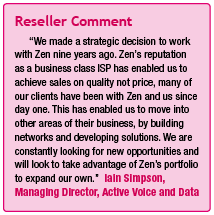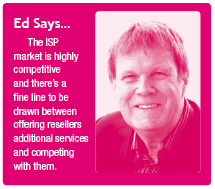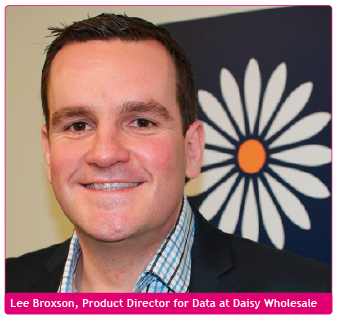
Internet Service Providers increasingly face the challenge of differentiating themselves – it’s never just about the price. Providing access solutions and making it profitable is difficult but many companies are finding that having a range of value added services and products is the way ahead.
At the expense of parodying Jessica Ennis, what do you want from your ISP?
I’ll speak for myself. I want a fast service that is nevertheless good value for money. I want a service with a very high amount of uptime – I’ll settle for one, maybe two ‘blips’ a year. I want someone at the other end of the phone that does not talk to me as an account number and who understands that my business is heavily reliant on their service working. I also want a brace solution to support this belt – which I have in the form of a reasonable 3G connection.
No I get all of this today from an ISP no-one would really have heard of that fibred out the new build estate I live on.
But that’s me. I’m a SOHO and not really a proper business user in the strictest sense although I do consume a heck of a lot of bandwidth occasionally.
Of course proper businesses, SMEs and Enterprises also need these basics – call them table stakes if you want, but can consume so much more in the way of services. Whether that be in the form of more industrial scale connectivity such as leased lines and or Ethernet or applications delivered over the connectivity such as SIP and unified communications and voice based services.
For resellers the position is relatively clear; as a supplier of the basic (or otherwise) connectivity, you stand a greater chance of also being the supplier of these overlay services and applications than if you were not. Therefore it would seem logical to partner with an ISP that can deliver all or most of the above services.
So what are these services and how can resellers engage with ISP’s that help them grow their sales?
Venus Business Communications has differentiated itself by focussing on what it is best at and providing superior connectivity with superior customer support.
“We are not trying to be all things to all men, says Brian Iddon, Venus Director. “Our market research shows us that customers are looking for quality above all, at good prices with high levels of customer support. Our reseller network is growing because we provide fibre optic leased lines at highly competitive prices with speeds of up to 100 gigabits per second.
Because we own and operate our network we can ensure quality and we support this with local engineers and great customer service. Our resellers have a dedicated account manager that understands their business and can provide them with information rapidly. Importantly, we understand resellers’ business models and tailor our offering around the feedback we get from them.
Abolishing ECCs, giving resellers fixed prices with peace of mind to close deals, and our recent Brazilian Bonanza package, offering discounted rates, proved to be very popular stimulating interest from further resellers looking to join our reseller network.
There are many ways to add value to a service proposition and often diversifying or bundling together products and services that are not core to your business can be a double-edged sword. Get it right and there are undoubtedly some benefits, but get it wrong and you compromise your core business. We are foremost a network operator and differentiate ourselves by being very good at what we do, so resellers know and value the core product and service they get from us.”
Some ISPs are now competing for hosted telephony business – providing the connectivity and the application sounds a reasonable idea – after all, it’s just the one throat to choke if there is a problem.
Venus are not in the business of competing in the hosted telephony market. “Our high quality network does provide opportunities for businesses to use VOIP, but we do not intend to dilute our business proposition by entering into the hosted telephony market,” says Iddon.
“We firmly believe that communication is very important and that specialists in this area should be engaged with directly by resellers and bundled together by them in tailored packages to meet their clients’ needs. The role of the reseller is to take the best that specialist companies can provide and deliver a tailored solution. We want resellers to be clear about our proposition and our expertise. There is a fine line between trying to add other products and services we have no control over to our proposition so in essence we stop being a provider and simply become a mini-reseller, selling to a reseller. When it goes wrong a reseller may be choking the one throat in an attempt to rectify a problem, but behind the scenes a wide variety of throat throttling may be happening in sub-contracted businesses far and wide,” reflects Brian Iddon, Venus Business Communications Director.
With the lines between the traditionally separate roles of IT and telecoms now completely blurred, any partner embarking on a customer comms project of any significant size will know that it’s no longer enough to rely on being an expert in one or the other. For example, there are many businesses out there solely dedicated to providing hosted services through the cloud. As connectivity becomes increasingly important to the delivery of quality cloud-based solutions, these providers have had to make a strategic decision to provide this as part of the package to give them more control and, of course, make extra margin. It’s becoming increasingly obvious that if you don’t provide the connectivity with your core offering then your competitor will and they’ll probably provide all the other value-add services along with it.
Timico Partners recognises this shift and has structured its team, its product portfolio and the design of its programme to offer the full range of both comms and IT services.
Darren Hilton, Director of Timico Partner Services told us, “For resellers, this means partnership with one provider that can offer all aspects of any given solution – from Ethernet connectivity as part of a WAN solution to SIP migrations and hosted IP telephony. Going down the single supplier route as opposed to building a solution from multiple providers has obvious time and efficiency savings for both the reseller and the customer, not just at the implementation phase, but throughout the duration of the contract.
Over the past few years, the industry has seen a number of significant shifts due to advances in technology and wholesale price reductions which means resellers’ customers can now benefit from more flexible, secure and reliable services at significantly lower cost than in the Noughties for example. Take the simple progression from basic ADSL to fibre broadband for instance, or the move from traditional analogue or ISDN lines to SIP Trunks or more recently, tape backup to cloud storage and physical servers to virtualisation.
 Any ISP partner looking to succeed in this market needs a credible offering encompassing all of these solutions and more, as the relationship between them becomes completely mutually dependent.
Any ISP partner looking to succeed in this market needs a credible offering encompassing all of these solutions and more, as the relationship between them becomes completely mutually dependent.
As an example, Ethernet presents a huge opportunity that resellers can really take advantage of. As broadband becomes a commodity and the demand for managed services grows, Ethernet has taken over as a huge growth area for high bandwidth connectivity, offering strong margins for resellers.
A more recent growth area for Timico has been in Virtual Data Centres (VDCs). Our reseller partners can benefit from the infrastructure which has been heavily invested in by Timico so that they, in turn, can become VDC providers with the flexibility to go to market with competitive pricing and reliable technology.
SIP represents another significant growth area for resellers. An industry survey conducted by Timico at the end of 2013 revealed that the channel is at risk of missing out on SIP reselling opportunities because of a lack of understanding from IT managers. A surprising 68% of those businesses surveyed were unaware of the benefits of SIP. A further 43% were unaware of whether they would be able to run SIP on their current phone system.”
Leveraging Assets
Looking at services and how resellers can engage with ISP’s that help them grow their sales, Lee Broxson, Product Director for Data at Daisy Wholesale, says, “I think the question should be ‘what is the wrap that makes the main service more attractive to the partners’. If we take Ethernet as an example, this is a product that very quickly became commoditised; every medium to large enterprise would like to have it and it is something you can buy from dozens of suppliers in our channel. So resellers need to be looking out for whatever it is that sets one ISP apart from the others. At Daisy Wholesale, we have done this by utilising the resources we have within the overarching group of businesses.
We have a team of over 200 engineers across the UK, so with every connection that we sell we include a managed install. We have a huge business broadband network at our disposal, therefore we will include ADSL backup with each Ethernet circuit that is ordered. And we are due to launch a monitoring service that will allow our resellers to observe each of their circuits through a NOC within the Daisy Wholesale Portal.
If you couple these with a business that makes deployment as simple as possible with a quoting tool and competitive pricing, I think it is safe to say that a reseller has made the right choice for an Ethernet partner.
There are many hosted voice suppliers out there that don’t have their own networks, however they have built fantastic businesses by concentrating on what they do best.
My feeling is that as long as the ISP is interconnected with the voice supplier, the tools that are available today can simplify the diagnosis of the issue and where it lies. In the main, you will also find that bigger ISPs offer a wider range of carriers and products, allowing more choice and subsequently more opportunity to the reseller community.”
“You’d be forgiven sometimes for thinking that it is all about price!,” says Daren Farnden, Head of Marketing at Entanet.
“We see a lot of evidence among reseller ISPs of a clear focus on price as the most important factor. Arguably that’s just a road to nowhere. You might win the business but at the expense of worthwhile margin and a customer relationship that’s based on the wrong principles.
It’s a competitive market but good ISPs take extra steps to illustrate the value they bring to a connectivity solution and benefit accordingly. Our strongest partners take a proactive role in helping their customers determine a solution that’s right for their business. They then work closely with us as their supplier to set clear expectations to their customers of the steps involved in providing the solution and keep them informed of progress throughout the provisioning process.
Even that’s not enough though and this leads to the relationship you have with your wholesale supplier. Whether you’re selling their connectivity packages or selling entirely under your own brand, how they contribute to the relationship has a big effect on your customers’ perceptions of you as their service provider. Reseller ISPs want flexibility when developing solutions that meet a customer’s needs, in a way that shows the customer they’re adding value to the relationship. For Entanet as a wholesaler that includes providing 1-to-1 pre-sales guidance and assistance even to the point of joining the ISP at customer meetings and designing a solution; or the flexibility to adjust solution components such as billing and technical support.
ISPs tell us that what makes for a good supplier partner is the flexibility of their network infrastructure to deliver a bespoke solution if needed; an ability to provision circuits smoothly and on time; stability in their network to better ensure a consistent service experience; an in-depth technical competency that helps give them and their customers confidence; and an appetite to negotiate creative commercial agreements that help them secure long term business.”
 Deborah Wrigley, Channel Sales Manager at ZEN, says her company adds reseller value in many ways.
Deborah Wrigley, Channel Sales Manager at ZEN, says her company adds reseller value in many ways.
“Zen builds technologies and services our partners can work with and add value to, and one of the ways we do that is by developing the right products for our own customers. If a product is robust, easy to work with, effective and good value, then it’s easier for resellers to use it as a platform.
Our portfolio also covers the full range of small, medium and large enterprises. If a partner is working with a small business that needs a single ADSL or Fibre connection, we can help. If a partner is handling a complex IP VPN solution covering hundreds of sites, or a technically-demanding hybrid cloud solution for a large corporation, we can help with that too. SIP Trunking and IP VPN services are important now and are only going to grow more crucial in the near future, and by offering the right combination of access technologies, IP VPN and SIP, partners can deliver next-generation, converged solutions that give their customers everything they need.
Partly, this is about finding the right access technologies. ADSL will still work for many smaller businesses, but as more companies move into Cloud computing and SIP trunking we expect to see a shift towards higher-speed Fibre Optic Broadband products based on FTTC and FTTP, not to mention Ethernet and EFM (Ethernet in the First Mile). We believe it’s possible to offer the speeds and reliability of conventional Leased Line services at a lower entry point - and we can do it without compromising on quality or service. That’s one of the reasons we’ve invested millions in a new network of PoPs (Points of Presence) covering every major business centre in the UK, and why we’ve built an NGN network that prioritises delay-sensitive and mission-critical applications. You can’t provide these services on shoestring connectivity solutions. You need something that’s built to handle the workload.
 It’s a similar story with services like colocation and Cloud services. These are going to be growth areas and the kind of products that we see partners using as a platform for their own integrated solutions. It’s not necessarily difficult to offer these services, but it takes a lot of planning, expertise and investment to get them right. The best providers to partner with will be those that aren’t just trying to offer those products on a network built for yesterday’s services, but those that are planning their network with tomorrow’s services in mind - proactively investing for the future.”
It’s a similar story with services like colocation and Cloud services. These are going to be growth areas and the kind of products that we see partners using as a platform for their own integrated solutions. It’s not necessarily difficult to offer these services, but it takes a lot of planning, expertise and investment to get them right. The best providers to partner with will be those that aren’t just trying to offer those products on a network built for yesterday’s services, but those that are planning their network with tomorrow’s services in mind - proactively investing for the future.”


